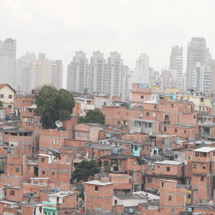
|
|
A slum neighbourhood in Sao Paulo, Brazil.
Photo: Cities Alliance |
[19 August 2010] -- Governments must embrace and plan for rapid urbanisation or risk increasing poverty and environmental degradation that could harm the future prospects of hundreds of millions of their citizens, warns a recent study published by the International Institute for Environment and Development (IIED) and the UN Population Fund (UNFPA) titled Brazil’s early urban transition: what can it teach urbanizing countries?.
Of particular concern are developing countries in Asia and Africa, which are facing unprecedented urban growth. How towns and cities in these countries evolve in the coming years will directly impact development, poverty and environmental conditions on a global scale.
The study urges policymakers to learn from the experience of Brazil, which has largely completed a rapid urbanisation process over the past three decades. Today, around 80 percent of the country’s population lives in urban areas.
In particular, Brazil’s failure to plan for rapid urban growth or address social inequalities exacerbated poverty and created new environmental problems as well as long-term costs that could have been avoided.
“Leaders of the urbanising world should embrace and plan for inevitable urban expansion, rather than vainly attempting to prevent it as Brazilian policymakers have done,” write the study’s authors, Dr. George Martine, a former UNFPA staff member and President of the Brazilian Association of Population Studies, and Dr. Gordon McGranahan, head of the Human Settlements Group at IIED.
Until now policymakers have primarily limited themselves to reacting to urbanisation, the study notes. This business-as-usual approach that will be “utterly inadequate” for the massive urban growth that is taking place in low- and middle-income countries throughout Asia and Africa. The result is likely to be increased poverty, slum growth, and ecological deterioration.
Lessons from Brazil’s urban transition
Published in August 2010, the studylooks at the process of urban growth in Brazil and reflects on past policies that failed as well as innovative policies of the present.
It begins with an overview of the historical trends in Brazil’s urban transition, followed by a section on the origins and consequences of housing problems that led to the persistent issue of slums and what could have been done to avoid them.
A third section looks at the determinants of success in specific cities, and the relevance of different policy options. The final part of the study analyses some of the more important approaches to urban policy in Brazil, including recent policies that are generating considerable international interest.
Because Brazil failed to address entrenched social inequalities and plan for urban growth, the country has been left with a legacy of social and environmental problems that prevent it from benefiting from the inherent advantages of urbanisation, the study contends.
Cities now provide 90 per cent of Brazil’s wealth but in 2007 more than a quarter of Brazil’s urban citizens lived below the poverty line and one in 15 were in extreme poverty. This means millions of people are excluded from key services and other benefits of urban life. They face immense social, economic and environmental challenges such as crime, pollution, unsafe housing and preventable diseases.
The study suggests several considerations for countries that are in the early stages of the urbanisation process:
- Plan for growth. Accept that the poor have a right to be in cities, then prepare in advance for their land and housing needs within a constantly updated vision of sustainable land use. Taking action after the fact is much more costly for both the city and the poor. Brazil would have done much better to try to accommodate urban growth earlier, rather than prevent settlement by the poor.
- Address inequalities. Addressing inequalities through democratic and participatory process matters. It is difficult and depends on the legal and political context, but important for poverty reduction and society as a whole. In Brazil, deeply ingrained inequality has not only determined many of the crucial characteristics of the urbanisation process, but also made policymakers unwilling and unable to deal effectively and proactively with what was clearly an inevitable transformation.
- Match infrastructure to prospective growth centres. Using economic arguments to determine what sort of urban centres should be favoured has not yielded the results generally hoped for by policymakers. This reduces the validity of traditional attitudes to deconcentration, the stimulation of smaller cities and even efforts to achieve interpersonal equity through fiscally sponsored spatial redistribution of economic opportunities. It is critical to match infrastructure to prospective centres of urban growth and recognise that infrastructure does influence where that growth occurs.
- Balance local needs with effective urban management. Cities generally become more fragmented as they expand, with large cities often having numerous administrative entities and layers responsible for urban issues. Yet some of the most critical urban problems cover a broad region and require a regional approach, while this fragmentation leads to administrative inefficiency and compounded social and environmental problems. A balance must be found that allows for the effective representation of local needs, especially those of the poor.
Download Brazil’s early urban transition: what can it teach urbanizing countries? (444 KB
)
For More Information
-
Read the press release on the report from UNFPA and IIED




